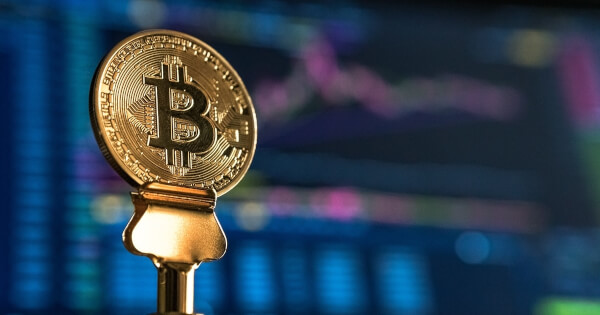Bitcoin Price Surges Amid Stock Market Bull—But This Could All Collapse if China Repeats its 2015 Stock Market Bubble
Bitcoin price saw a slight surge at the start of this week, while China’s stocks soared as no new local coronavirus cases were reported. US stocks also followed and saw an upward tick as investors focused on news related to the new COVID-19 vaccine and treatments.

Bitcoin price saw a slight surge at the start of this week, while China’s stocks soared as no new local coronavirus cases were reported. US stocks also followed and saw an upward tick as investors focused on news related to the new COVID-19 vaccine and treatments.

According to market analyst Jim Wyckoff, Bitcoin bulls “have the overall near-term technical advantage,” and that the recent collapse in volatility could lead to a bigger price move.
China told its citizens to buy stocks—a possible stock market bubble?
The Shanghai Composite Index has seen its biggest one-day percentage gain since the summer of 2015 when the stock market bubble burst. The index saw a 5.7 percent surge on July 6, following a state-owned publication in China advocating for a “healthy bull market” in the country for post-pandemic recovery.
However, stocks in the Asia Pacific were mixed on July 7 as investors await the Reserve Bank of Australia’s interest rate decision. Mainland China continued on July 6’s gains, as the Shenzhen component jumped 2.842 percent and the Shanghai Composite rose 1.32 percent.
In a front-page editorial in the state-owned China Securities Journal, the publication said investors should look forward to the “wealth effect of the capital markets.” Retail investors have been playing a role in the recent bull market, along with professional traders.
There has been speculation about whether the trading circles and with the retail investors rushing in with the effect of the publication had anything to do with a possible stock market bubble forming in China. With the recent rapid surges, traders compared to the stock market bubble in 2015, with stocks trading at nearly 5,200, while July 6’s close was at 3.332.88.
Mark Williams, the Chief Asia Economist at Capital Economics said:
“There’s quite a long history of policy makers using the media to drive up the market. It doesn’t always end very well. We saw that back in 2015, exactly the same statements then. They tried to push the market higher. It worked for a while and then the market collapsed.”
Kenny Wen, wealth management strategist at Everbright Sun Hung Kai said:
“It may be too early to say it is a bubble, as in terms of valuation, A shares are still reasonable. The transaction volume has increased sharply. We see both domestic retail investors and global investors rushing into A shares.”
Bitcoin and the stock market
Following the Asian stock market, US stocks jumped as well amid the second wave of surging coronavirus cases in the country.
The stocks on Wall Street saw an uptick as well, while the Dow Jones Industrial Average jumped 1.8 percent, and the S&P 500 rose 1.6 percent, and the Nasdaq Composite hit an all-time high, surging 2.2 percent to close at 10,433.65.
Bitcoin showed signs of a slight bullish uptick in its first session in July and maintained a short-term positive correlation with the S&5 500.
Bitcoin and stocks investors are waiting for the next big decision that could drive a new rally—whether or not the Federal Reserve would expand its stimulus operation before it expires in July.
The recent Bitcoin price rally was ignited by China’s record stock market gains on July 6. As the United States has vast exposure to world’s second-largest economy, the US stock market simply followed suit.
Goldman Sachs: Yuan crash forecast
Goldman Sachs is expecting the Chinese yuan to fall to its lowest since 2008 in the coming months due to the existing US-China trade war, and now the US potential sanctions on China over its feud over Hong Kong and the implementation of the National Security Law.
The yuan has been forecasted by Goldman Sachs to fall to 7.25 per dollar during the next three months before recovering to 7.15 per dollar over six months, then to 7 per dollar in the next year. As the firm sees the yuan falling to its 2008 low, the potential for Bitcoin to experience an explosive price rally has been raised.
“Disputes between the two countries now cover a range of issues that are unlikely to be resolved soon,” wrote Goldman strategists, including Zach Pandl. Due the tolerance from the Chinese central bank on gradual currency depreciation, the strategists added, “As a result, we expect ongoing capital outflow pressures to weigh on the exchange rate and are revising our dollar-yuan forecasts higher.”
Image source: André François McKenzie via Unsplash


.jpg)
